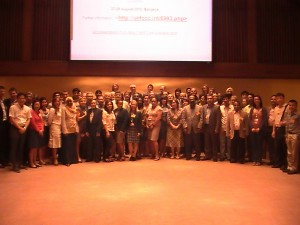Dr. Akio Takemoto, Director, APN Secretariat
27-29 August, 2012, Bangkok, Thailand — The APN was represented by Dr. Akio Takemoto in the Expert Meeting on a Range of Approaches to Address Loss and Damage associated with the Adverse Effects of Climate Change, including Impacts Related to Extreme Weather Events and Slow Onset Events, organized by the UNFCCC Secretariat. The meeting was held in response to the request by the Parties to address the following questions, with focus on Asia:
- What is the full range of approaches and tools that can be used to address the risk of loss and damage, at all levels and for a broad range of sectors and ecosystems, considering both extreme weather events and slow onset events?
- What are the foundational resource requirements (e.g. budget, infrastructure, and technical capacity for implementation) in order for different strategies and tools to be effectively applied?
- What are the lessons learned from existing efforts within both the public and private sectors, considering elements of design, limitations, challenges and best practices?
- What are the links and synergies between risk reduction and other instruments such as risk transfer? How can comprehensive risk management portfolios or toolkits be designed?
- How can risk management approaches be tailored to national contexts? How can Parties and other stakeholders evaluate which tools might be most appropriate for their particular risks and circumstances?
There are broad thematic areas to be considered in the implementation of the work programme on loss and damage associated with the adverse effects of climate change:
- Assessing the risk of loss and damage associated with the adverse effects of climate change and current knowledge on the same;
- A range of approaches to address loss and damage associated with the adverse effects of climate change, including impacts related to extreme weather events and slow onset events, taking into consideration experience at all levels; and
- The role of the Convention in enhancing the implementation of approaches to address loss and damage associated with the adverse effects of climate change.
 For the Bangkok Expert Meeting, invited experts from the Parties, organizations and networks submitted information sheets on a range of approaches to address loss and damage based on the request by the UNFCCC Secretariat. Dr. Takemoto, Director of APN Secretariat, submitted the information sheet on behalf of APN to suggest “Mainstreaming Scientific Knowledge into the Formulation and Implementation of Adaptation Plans at National and Sub-National Scales” as an objective of the approach to address loss and damage in the Asia-Pacific region (download information sheet). This document reflected the outcomes of the Scoping Workshop to Enhance the Climate Adaptation Actions of APN Developing Countries, 20-22 August 2012, Kobe Japan, which suggested the development of a future APN adaptation programme.
For the Bangkok Expert Meeting, invited experts from the Parties, organizations and networks submitted information sheets on a range of approaches to address loss and damage based on the request by the UNFCCC Secretariat. Dr. Takemoto, Director of APN Secretariat, submitted the information sheet on behalf of APN to suggest “Mainstreaming Scientific Knowledge into the Formulation and Implementation of Adaptation Plans at National and Sub-National Scales” as an objective of the approach to address loss and damage in the Asia-Pacific region (download information sheet). This document reflected the outcomes of the Scoping Workshop to Enhance the Climate Adaptation Actions of APN Developing Countries, 20-22 August 2012, Kobe Japan, which suggested the development of a future APN adaptation programme.
During the Expert Meeting, there was intensive discussion on the above questions. Dr. Takemoto made many comments on the information submitted to the UNFCCC Secretariat. There was a debate over the terminologies of “disaster risk reduction”, “adaptation” and “loss and damage”. One observation to this question was that loss and damage is a separate issue, but related to adaptation and that there is a need to go beyond adaptation to address residual risk.
There was discussion on the different types of approaches with regard to disaster risk management, such as “risk reduction/prevention/retention”, “risk transfer”, which includes insurance, and “risk finance”, which includes climate-proof infrastructure projects supported by climate risk assessment.
Concerning approaches to address slow onset events, participants pointed out the following priorities: transboundary cooperation, strengthening decision-making, assessment of potential loss and damage as an essential first step, communication with relevant stakeholders, development of specific methods and technologies and tools based on community needs, most of which were included in the output of the APN Scoping Workshop in Kobe.
There was also discussion on various types of approaches at sub-national, national and regional levels. Many participants highlighted data sharing to be applicable by users and capacity-building for data mining.
Participants also pointed out the importance of networking for enhancing data sharing, good practices, tools and approaches in the Asia-Pacific region. The International Institute for Environment and Development (IIED), Asian Development Bank (ADB) and Asia-Pacific Adaptation Network (APAN) particularly showed interest in collaborating with APN and other organizations and networks to address loss and damage in Asia under the UNFCCC Cancun Frameworks.
For further information, see the following UNFCCC web site: http://unfccc.int/adaptation/cancun_adaptation_framework/loss_and_damage/items/6993.php
